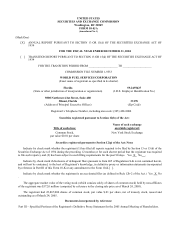World Fuel Services 2004 Annual Report Download - page 18
Download and view the complete annual report
Please find page 18 of the 2004 World Fuel Services annual report below. You can navigate through the pages in the report by either clicking on the pages listed below, or by using the keyword search tool below to find specific information within the annual report.If we are unable to retain our senior management and key employees, our business and results of operations could be
harmed.
Our ability to maintain our competitive position is dependent largely on the services of our senior management and
professional team. If we are unable to retain the existing senior management and professional personnel, or to attract other
qualified senior management and professional personnel, our businesses will be adversely affected.
The failure to effectively manage our rapid growth could have an adverse effect on our business.
We have rapidly expanded our operations in recent years and we intend to continue to pursue existing and potential
market opportunities. This rapid growth places a significant demand on our management and operational resources. If we
are unable to manage our growth effectively, our business, financial condition, and results of operations will be adversely
affected.
The integration of an acquired company may have an adverse effect on our operations.
Our business has grown, in part, as a result of our acquisition of other companies. On April 2, 2004, we acquired
Tramp Oil and, since that time, we have been integrating this business with our existing operations. The integration of an
acquisition typically involves a number of risks that may adversely affect our operations. These risks include diversion of
management’ s attention, difficulties in the integration of acquired operations and retention of personnel, entry into
unfamiliar markets, unanticipated problems or legal liabilities, and tax and accounting issues. Furthermore, once we have
integrated an acquired company, the business may not achieve the same levels of revenue or profitability as our other
operations, or otherwise perform as expected.
We are involved from time to time in legal proceedings and commercial or contractual disputes, which could have an
adverse impact on our profitability and consolidated financial position.
We are involved in legal proceedings and commercial or contractual disputes that, from time to time, are significant.
These are typically commercial or contractual claims that arise in the normal course of business including, without
limitation, disputes with our suppliers and customers. Such proceedings and claims could have a material adverse effect
on our profitability and consolidated financial position if decided adversely.
Risks Related to Our Industry
Adverse conditions in the shipping and aviation industries may have an adverse effect on our business.
Our business is focused on the marketing of fuel and fuel-related services to the shipping and aviation industries.
Therefore, any adverse economic conditions in these industries may have an adverse effect on our business. In addition,
any political instability, terrorist activity or military action that disrupts shipping or flight operations will adversely affect
our customers and may reduce the demand for our products and services. Our business could also be adversely affected by
increased merger activity in the airline and shipping industries, which may reduce the number of customers that purchase
our products and services, as well as the prices we are able to charge for such products and services.
Material disruptions in the availability or supply of oil may adversely affect our business.
The success of our business depends on our ability to purchase, sell and deliver fuel and fuel-related services to our
customers. Our business would be adversely affected to the extent that political instability, natural disasters, terrorist
activity, military action or other conditions disrupt the availability or supply of oil.
Changes in the market price of petroleum may have a material adverse effect on our business.
Increases in fuel prices can adversely affect our customers’ businesses, and consequently increase our credit losses.
Increases in fuel prices could also affect the credit limits extended to us by our suppliers, potentially affecting our liquidity
and profitability. In addition, increases in oil prices will make it more difficult for our clients to operate and could reduce
demand for our services. Conversely, a rapid decline in fuel prices could adversely affect our profitability because
inventory purchased by us when fuel prices were high may have to be sold at lower prices.
Page 6 of 72
























